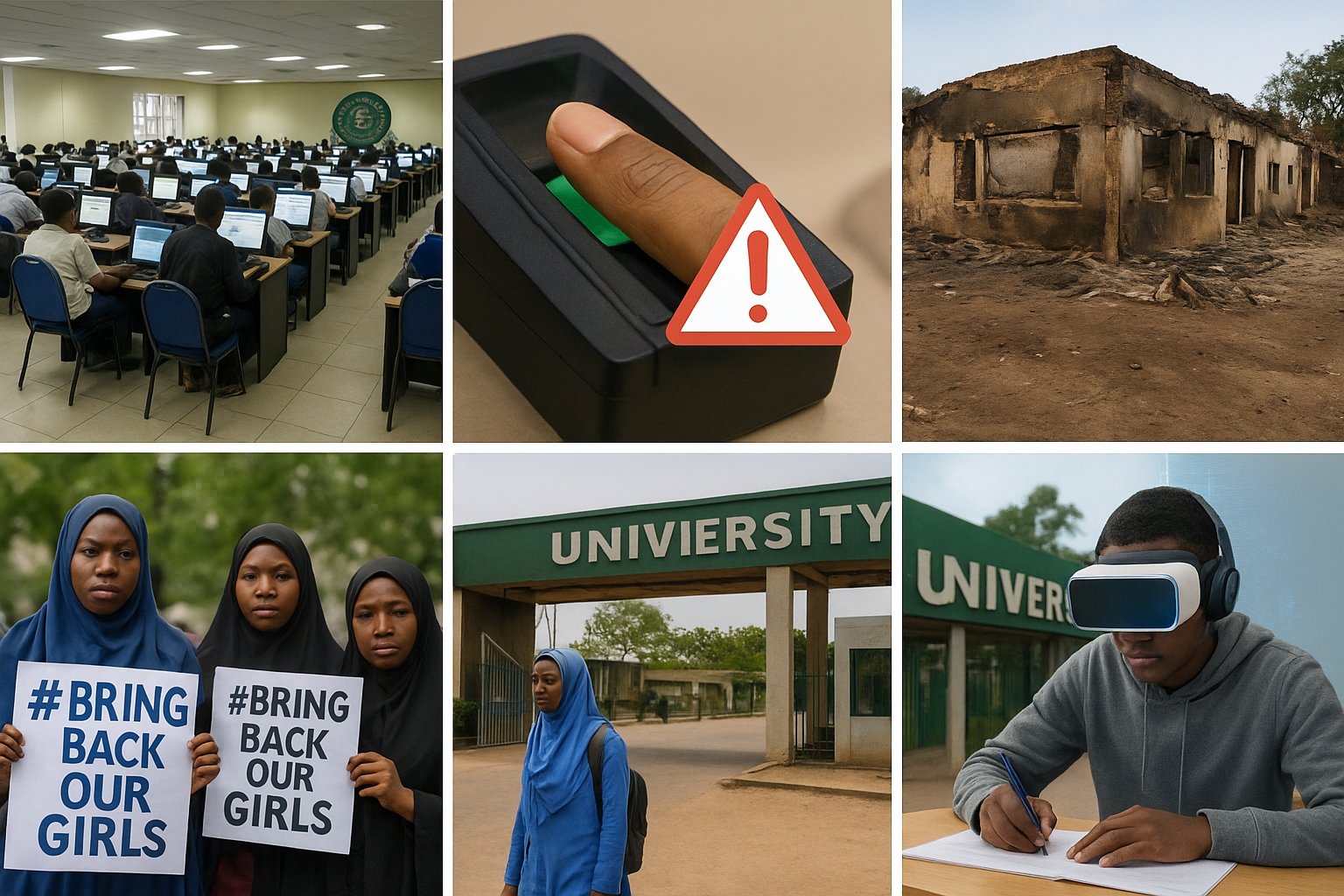Exams are supposed to test what you know, but in Nigeria, they’re fast becoming a battle against high-tech cheats.
The Joint Admissions and Matriculation Board (JAMB) just dropped a bombshell: thousands of students tried to beat the 2025 UTME system with fake fingerprints, false disability claims, and even Artificial Intelligence impersonation.
A special panel uncovered over 4,000 cases of “finger blending” and nearly 200 AI-powered scams, exposing how exam malpractice has gone digital and become increasingly normalised.
This shocking revelation is only one chapter in a bigger story. From unsafe schools to religious dress code battles and scandals in private institutions, Nigeria’s education sector has been rocked by controversies that raise challenging questions about safety, fairness, and accountability.
Together, these cases paint a worrying picture of how fragile learning environments can be for Nigerian students. Here are five of the most notable controversies shaking the sector.
1. JAMB Panel Uncovers Mass Tech-Enabled Malpractice in 2025 UTME
A special committee set up by the Joint Admissions and Matriculation Board (JAMB) revealed widespread examination fraud in the 2025 UTME, highlighting a new, high-tech dimension plaguing Nigeria’s admission system.
The committee uncovered 4,251 cases of “finger-blending”, where candidates manipulated biometric verification systems, and 190 incidents of AI-assisted impersonation via image morphing.
Additionally, there were 1,878 false disability claims, along with instances of credential forgery, multiple NIN registrations, and organised syndicate collusion involving parents, schools, tutorial centers, and even some CBT operators.
Chairman Jake Epelle characterised the malpractice as “highly organised, technology-driven, and culturally normalised,” warning that existing laws are insufficient to deter such offences.
The committee’s recommendations include deploying AI-powered biometric anomaly detection, real-time monitoring, and establishing a National Examination Security Operations Centre, alongside establishing stronger punitive measures such as result cancellations, bans, prosecution, and a central sanctions registry.
2. Deadly Fire in Islamic School Exposes Safety Oversights
In a tragic event in February 2025, at least 17 children died and numerous others were injured in a fire at an Islamic school in Kaura Namoda, Zamfara State.
Initial investigations suggested that a buildup of “kara” (sticks used for oral hygiene) near the school premises was the probable cause. The incident highlighted long-standing failures in implementing safety protocols, despite the 2014 Safe School Initiative’s efforts aimed at preventing such disasters.
President Bola Tinubu publicly extended condolences and urged regulators to enforce compliance with safety guidelines. He emphasised that schools must prioritise children’s safety, a directive sharply issued following a separate explosion at a school near Abuja the previous month.
3. #BringBackOurGirls: Enduring Pain of Chibok Abductions
Eleven years after Boko Haram abducted 276 schoolgirls from Chibok in April 2014, approximately 100 remain unaccounted for, exposing profound shortcomings in security and post-crisis management.
While some girls have been freed or escaped, many survivors face stigmatisation, trauma, and societal rejection.
Negotiations for the release of the remaining girls have stalled, and the government’s efforts have been criticised as insufficient and lacking in urgency.
The Chibok tragedy remains emblematic of persistent threats to education from insurgents. Despite its significance, governmental attention has waned, and millions of out-of-school children still lack protection, with the crisis continuing to impact access to education and social healing.
4. Veil Bans in Universities Spark Religious Discrimination Debate
Universities in Nigeria have sparked heated controversy by banning the niqab and hijab, limiting educational access and religious expression for Muslim women.
Notably, an Osun State university’s Faculty of Education barred niqab wearers from participating in practical classes, such as physical education, prompting Musliah Tunmise to abandon her teaching aspirations.
Research by the Muslim Public Affairs Centre (MPAC) reveals that 87.6% of niqab-wearing women face discrimination on campuses, much of it originating from educational institutions’ clothing policies.
Advocacy groups, including Muslim Rights Concern (MURIC), have condemned these bans as violations of constitutional freedoms. Calls for religious freedom and cultural accommodation have intensified, with some proposing the creation of institutions where religious attire is respected.
5. Chrisland Schools Scandals
Chrisland Schools remain at the center of public outrage over multiple incidents reflecting institutional negligence:
In 2016, a pupil’s mother accused a teacher of raping her two-year-old child. The school initially defended the accused, but the Lagos court later convicted him and sentenced him to 60 years in prison.
In 2022, a filmed sexual incident involving a 10-year-old pupil during a school event in Dubai went viral. The school blamed the child and suspended her. The Lagos State Government intervened, closing and later reopening all branches while launching investigations.
In 2023, student Whitney Adeniran collapsed during a sports event and died due to asphyxia. The lack of medical facilities at the venue raised questions, and negligence proceedings are still ongoing.
>
